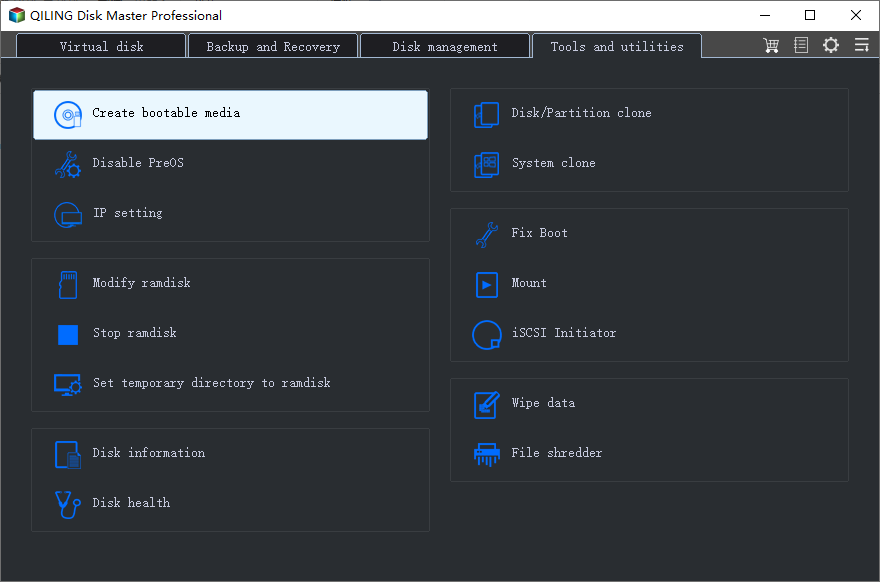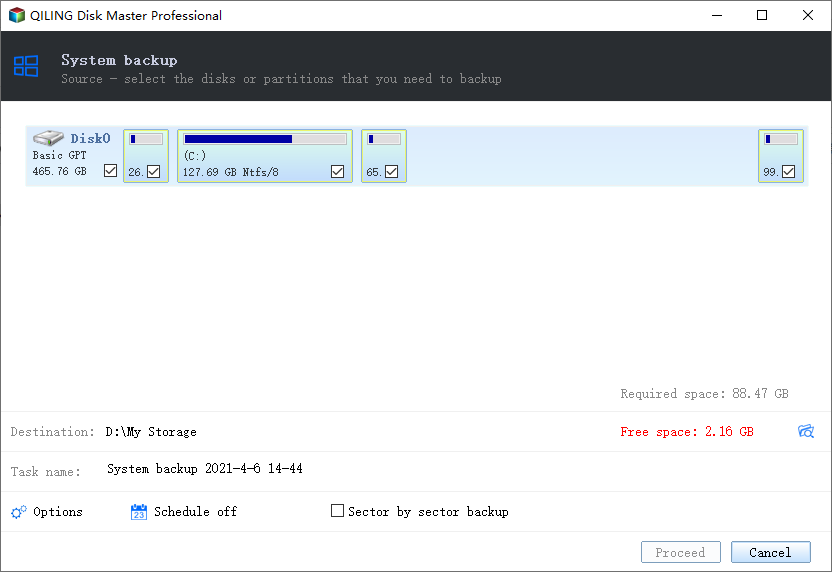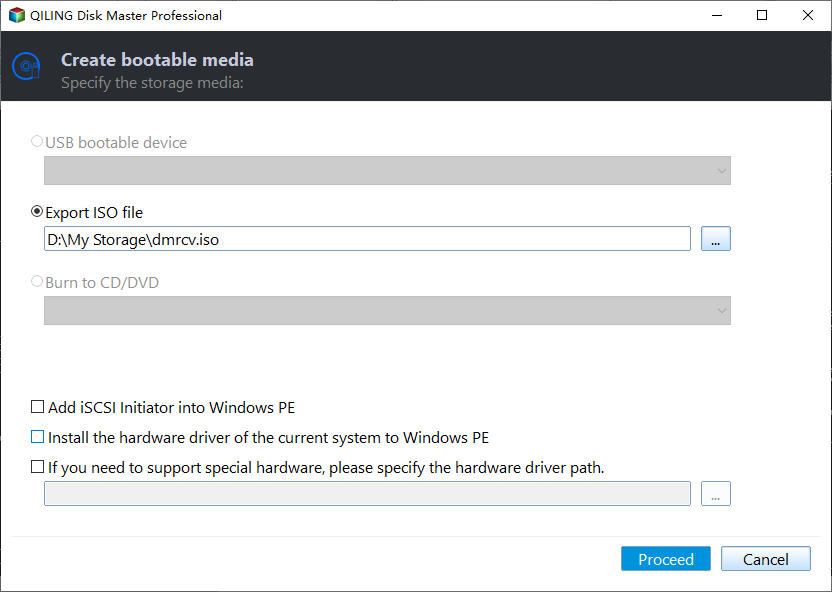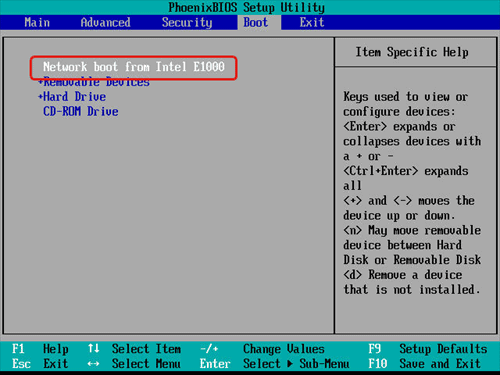How to Install OS on Multiple Computers Simultaneously
Can you install Windows 10 on multiple computers at the same time?
Creating an image for identical hardware PCs can save you a significant amount of time and effort.
Creating a custom image for multiple computers can save you a significant amount of time and effort.
You could use a reliable backup and image deployment software can save you a significant amount of time and effort when deploying the operating system to multiple computers.
You're using a retail product key on multiple computers is not legal and may not be activated correctly.
Need reliable backup software and image deployment software
To install operating system on multiple computers, you need both backup software and image deployment software. I highly recommend you Qiling Disk Master Standard and Qiling Image Deploy.
Qiling Disk Master Standard is a trusted and reliable backup software used worldwide. It can help you backup system or disk in a very short time. And it also provides extra features, such as daily/weekly/monthly backup, full or incremental backup, etc.
Qiling Image Deploy is a free image deployment and network cloning software that offers several advantages. Here are some of the key benefits:
- This software is free and easy to use.
- This software supports multiple operating systems, including Windows 7, 8, 10, 11 and Server 2003, 2008, 2012, 2016, 2019, 2022.
- The server machine can monitor the process in real time.
- Qiling Image Deploy offers a convenient feature that allows you to batch preset client computers' names. This can be particularly useful when managing multiple machines. However, to preset IP addresses, you will need to upgrade to Qiling Image Deploy Technician.
✍ Helpful tip:
If you're looking for a more streamlined solution, you can consider using Qiling Disk Master Technician or Technician Plus. These tools combine the functionality of Qiling Image Deploy with the backup feature, eliminating the need to install multiple software programs.
Example: Install OS on multiple computers simultaneously
If you're planning to install Windows on multiple computers simultaneously, you can use a tool like Qiling Disk Master Technician or Technician Plus to streamline the process. These tools can help you create a customized image of your Windows installation and deploy it to multiple machines with ease.
- To deploy Windows on multiple computers simultaneously, you'll need to designate one computer as the server computer. This server computer should be a fully functional machine with a Windows system installed. All target computers must be connected to the same Local Area Network (LAN) as the server computer.
- Ensure the Windows Recovery Environment (Windows RE) of server computer is complete. If it is incomplete or the system is older than Windows 7, please download Windows AIK/ADK.
- To confirm that the network card of client computers supports network boot (PXE boot).
How to install operating system on multiple computers at the same time
To install Windows 10 on multiple computers with identical hardware, follow these steps:
Tip: To deploy a system image to computers with dissimilar hardware, such as different CPUs or motherboards, you can use the "Universal Restore" feature in Qiling Image Deploy Technician.
1. To create a system image without a SID, you'll need to create a bootable disk using Qiling Disk Master Standard on the server computer.
2. To remove the SID on the server computer and avoid compatible issues after deployment, you can use the Sysprep.exe tool.
3. Boot the server computer from the bootable USB just made and create a full system image with Qiling Disk Master. You need to put the image on NAS or network share folder, which is on the same network segment of the same LAN as the server computer and all the client computers.
4. Boot the server computer normally. Free download, install and launch Qiling Image Deploy.
5. Create bootable WinPE ISO file for client computers. Select “Create WinPE automatically” or “Create bootable WinPE ISO manually” and click “Next”.
Tip: To deploy an image over a network, you'll need to ensure that your Local Area Network (LAN) has a working DHCP server. If you don't have a DHCP server on your LAN, you can enable a built-in DHCP server within the deployment tool to facilitate the image deployment process.
6. Use WinPE ISO file to boot your client computers. Once Qiling Image Deploy shows "The service has started, waiting for connect...", start all the client computers from network boot and wait for them to boot up successfully.
- Enter into BIOS by clicking the specific key (usually F2 or ESC).
- Go to “Boot” tab and press “+” to move “network boot” to the first option.
7. You will see the IP addresses and connection status of the client computers. Then, tick the checkbox before “I confirm all the client computers which need to be deployed are online” and click “Next”.
8. Specify the image file and configure the deployment settings. Finally, click “Start Deploy”.
- Click “Browse” to find your image file saved on network share or NAS. Here the image file is Windows 10.
- Select the online computers you want to deploy image to. You can check "All" to select all of them.
- Input the destination disk number. If you keep only one disk in all client computers, the disk number should be "0".
- Manually type the number of computers to be deployed every time. Here deployed computers are "10" every time.
- Click "Settings" in the lower-left corner to set a prefixed name for the computers to be deployed if needed.
9. View the image deployment progress on server computer and wait. You can choose whether to shut down or restart the client computers after the deployment is completed.
Written in the end
Now you know how to install OS in multiple computers at a time - you need to create a system image backup with trusted and reliable backup software like Qiling Disk Master, and then use image deployment software to clone Windows 10, 8, 7 to multiple computers at once. If you need to run dissimilar hardware restore, Qiling Image Deploy Technician is recommended as it offers the "Universal Restore" feature to avoid boot failure after deploying.
Related Articles
- How to Clone Windows 7 to Multiple Computers Simultaneously?
You will learn how to easily clone Windows 7 to multiple computers with all-in-one backup software. Also, it is able to clone Windows 7 to new computer. - How to Use Network Boot Multiple Computers?
If you have more than one computer to install or maintain, it would be much more convenient to network boot multiple computers with PXE. But how does it work? - Image Deployment: Deploy OS Image to Multiple Computers over Network
Learn how to deploy a system or disk image to multiple computers on the same network with the best free OS image deployment software - Qiling Image Deploy. - Best Free Microsoft Deployment Toolkit (MDT) Alternative
Want to find a Microsoft Deployment Toolkit alternative to create a Windows 10 image for deployment? How to deploy Windows 10 image to multiple computers simultaneously? Just see the step-by-step guide.




